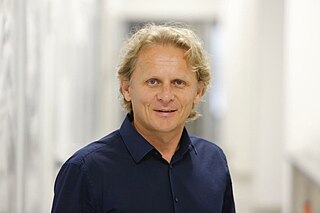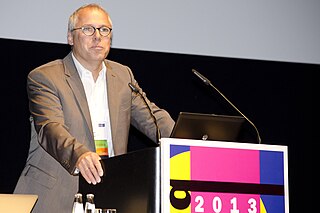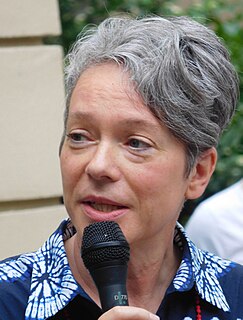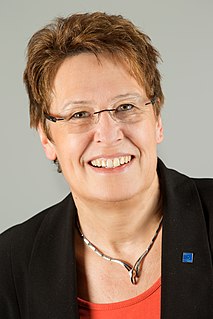Related Research Articles

Christiane (Janni) Nüsslein-Volhard is a German developmental biologist and a 1995 Nobel Prize in Physiology or Medicine laureate. She is the only woman from Germany to have received a Nobel Prize in the sciences.

Goethe University is a university located in Frankfurt am Main, Germany. It was founded in 1914 as a citizens' university, which means it was founded and funded by the wealthy and active liberal citizenry of Frankfurt. The original name was Universität Frankfurt am Main. In 1932, the university's name was extended in honour of one of the most famous native sons of Frankfurt, the poet, philosopher and writer/dramatist Johann Wolfgang von Goethe. The university currently has around 45,000 students, distributed across four major campuses within the city.

The Max Planck Society for the Advancement of Science is a formally independent non-governmental and non-profit association of German research institutes. Founded in 1911 as the Kaiser Wilhelm Society, it was renamed to the Max Planck Society in 1948 in honor of its former president, theoretical physicist Max Planck. The society is funded by the federal and state governments of Germany.

Hartmut Michel is a German biochemist, who received the 1988 Nobel Prize in Chemistry for determination of the first crystal structure of an integral membrane protein, a membrane-bound complex of proteins and co-factors that is essential to photosynthesis.
The Gottfried Wilhelm Leibniz Prize, in short Leibniz Prize, is awarded by the German Research Foundation to "exceptional scientists and academics for their outstanding achievements in the field of research". Since 1986, up to ten prizes are awarded annually to individuals or research groups working at a research institution in Germany or at a German research institution abroad. It is considered the most important research award in Germany.

Klaus Rajewsky is a German immunologist, renowned for his work on B cells.

Eugene Wimberly "Gene" Myers, Jr. is an American computer scientist and bioinformatician, who is best known for contributing to the early development of the NCBI's BLAST tool for sequence analysis.
The Paul Ehrlich and Ludwig Darmstaedter Prize is an annual award bestowed by the Paul Ehrlich Foundation since 1952 for investigations in medicine. It carries a prize money of 120,000 Euro. The prize awarding ceremony is traditionally held on March 14, the birthday of Nobel laureate Paul Ehrlich, in the St. Paul's Church, Frankfurt am Main.

Bernhard Hassenstein was a German biologist and behaviorist.

Ivan Đikić is a Croatian-German molecular biologist who is the Director of the Institute of Biochemistry II at Goethe University Frankfurt.

Peter Hegemann is Professor and Head of the Department for Biophysics at the Humboldt University of Berlin, Germany. He studied chemistry in Münster and Munich and earned his PhD 1984 in Munich with an investigation into the structure and function of halorhodopsin, a light-driven chloride pump in Halobacterium halobium. As a postdoc, he worked in the research groups of Dieter Oesterhelt and with Kenneth W. Foster at Syracuse University. In 1986, he started a research group in the Department of Membrane Biochemistry at the Max-Planck-Institute of Biochemistry in Frankfurt, Germany. He became professor at the University of Regensburg and was appointed full professor at the Humboldt-University of Berlin in 2004. In 2015, he was awarded a Senior Research Professor position in Neuroscience by the Hertie Foundation.

Birgitta Wolff is a German economist and politician of the Christian Democratic Union (CDU). She served as minister of education and culture and as minister of research and economy in the state government of Saxony-Anhalt from 2010 to 2013, and as president of the Goethe University of Frankfurt from 2015 to 2020.

Emmanuelle Marie Charpentier is a French professor and researcher in microbiology, genetics, and biochemistry. Since 2015, she has been a Director at the Max Planck Institute for Infection Biology in Berlin. In 2018, she founded an independent research institute, the Max Planck Unit for the Science of Pathogens. In 2020, Charpentier and American biochemist Jennifer Doudna of the University of California, Berkeley, were awarded the Nobel Prize in Chemistry "for the development of a method for genome editing". This was the first science Nobel ever won by two women alone.

Detlev Ganten is a specialist in pharmacology and molecular medicine and is one of the leading scientists in the field of hypertension. He founded the World Health Summit in 2009. He was Chairman of the Foundation Board of the Charité Foundation (2005–2015), editor of the Journal of Molecular Medicine, Chairman of the Board of Trustees of the Max Planck Institute of Colloids and Interfaces and Max Planck Institute of Molecular Plant Physiology as well as Chairman of the Board of Trustees of the Ethnological Museum Dahlem of the Prussian Cultural Heritage Foundation.

Martin Vingron is an Austrian mathematician working in the fields of bioinformatics and computational biology. Since 2000, he has been Director of the Max Planck Institute for Molecular Genetics.
Amparo Acker-Palmer is a German-based Spanish cell biologist and neuroscientist. Her research focuses on the similarities of the mechanism of nerve and blood vessel development. She has worked alongside her husband, Till Acker, who is a neurobiologist, in researching tumor therapies. In her career, she has won several awards, including the Paul Ehrlich & Ludwig Darmstaeder Prize for Young Researchers in 2010. In 2012, Amparo Acker-Palmer was elected as member of the German Academy of Sciences Leopoldina.

Ina Hartwig is a German writer, literature critic and academic lecturer. From July 2016, she has been Kulturdezernentin in Frankfurt, the city councillor responsible for culture and science.

Astrid Beckmann is a German physicist, a professor of mathematics and mathematics education, and was a long-serving university president. Beckmann served as president of the Pädagogische Hochschule Schwäbisch Gmünd from 2010 to 2018. She also taught at the University of Ulm from 2007.

Manuela Rottmann is a German lawyer and politician of the Alliance 90/The Greens who has been serving as Parliamentary State Secretary in the Federal Ministry of Food and Agriculture in the coalition government of Chancellor Olaf Scholz since 2021. She has been a member of the Bundestag from the state of Bavaria since 2017.
Juri Rappsilber is a German chemist in the area of mass spectrometry and proteomics.
References
- ↑ "People", Molecular Bioinformatics, Goethe University Frankfurt, retrieved 2021-11-12
- 1 2 "Ina Koch" (PDF), Researcher portraits (in German), Cluster of Excellence Frankfurt Macromolecular Complexes , retrieved 2021-11-12